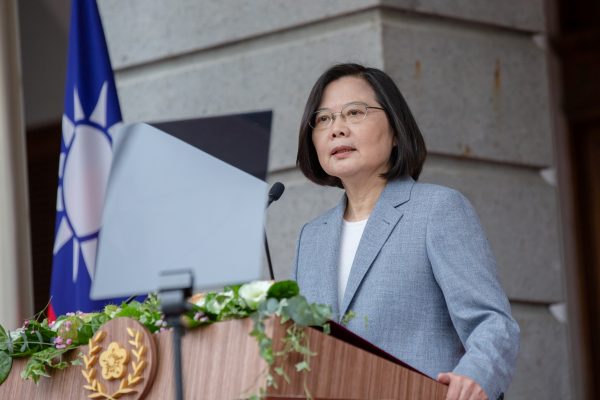First was the reintroduction of Chinese smartphones in Taiwan. Vivo, a Chinese tech firm, is set to introduce two smartphone models into the Taiwanese market. The comeback was made after the National Communications Commission (NCC) of Taiwan started restricting technology devices containing ‘sovereignty-degrading’ substance in November 2019.
Passing the NCC audit implies that Vivo is willing to erase terms such as ‘Chinese–Taiwan’ on its products. Such involvement would have been unimaginable in 2018 when Beijing forced international airlines to purge all references to Taiwan as a separate country. Though Vivo suddenly halted its sales on 1 June 2020 due to ‘technical’ problems, Chinese authorities and media remain unusually quiet.
Next was the Chinese government’s announcement of economic bonuses for Taiwanese businesses before the second-term inauguration of Taiwanese President Tsai Ing-wen on 20 May, 2020. Defying numerous predictions, China’s Taiwan Affairs Office of the State Council — the mainland administrative agency responsible for implementing policies related to Taiwan — rolled out 11 economic incentives for Taiwanese entrepreneurs in China on 15 May.
Liu Jie-yi, Director of the Taiwan Affairs Office, recently delivered a speech indicating that ‘the contours of cross-strait economic cooperation had not changed’. China News Service, an official mouthpiece of the CCP, published a subsequent article signifying policies of ‘cross-strait integration’ will continue with or without the disassociation of Taiwan’s Democratic Progressive Party (DPP) government.
Last but not least is the continuation of the Economic Cooperation Framework Agreement (ECFA), a significant token of cross-strait goodwill that partially ended discriminatory trade and investment policies between the both sides in 2010. There were once concerns about China halting the ECFA to ‘choke Taiwan’s economy’, but Vice President of the All China Taiwan Federation of Mainland China Yang Yi-zhou emphasised that Beijing would ‘definitely not easily scrap the ECFA’ and that ‘cross-strait economic relations should be properly maintained in tough times’.
Beijing’s quiet efforts to subdue cross-strait disagreement also extend to political statements. Chinese Premier Li Keqiang recently delivered a report stressing the importance of reviving the Chinese economy and scantly mentioned Taiwan. Li not only eliminated the adjective ‘peaceful’ before ‘unification,’ but also muted the controversial ‘1992 consensus’ in his comments with regards to Taiwan. Known for its carefully worded pronouncements, the CCP is unlikely to err on such important and irrevocable speeches, although less formal ‘clarifications’ were made after Li’s report.
Taiwanese President Tsai’s inauguration speech two days before Li’s report seemed to pave the way for Beijing to change tone slightly. Despite the fact that Tsai’s landslide re-election was based on mass Taiwanese opposition to Chinese influence, Tsai stuck firmly to ‘the Constitution of the Republic of China’ and the ‘Act Governing Relations between the People of the Taiwan Area and the Mainland Area’. Both laws imply an openness towards a ‘unified China’ in the long term.
Beijing’s silent change might be a strategic attempt to avoid war with the United States and to deal with one problem at a time. The domestically-weakened and unstable US President Donald Trump is on the path to being increasingly bellicose towards China, and the Taiwanese Strait or South China Sea may serve as a ‘great’ battlefield between the two nations. But China is circumspect about annexing Taiwan, with retired PLA general Qiao Liang recently warning about the risks of invading Taiwan.
Considering the differences between Hong Kong and Taiwan, it is easier for Beijing to solve its perceived Hong Kong ‘problem’ first. Unlike Hong Kong, Taiwan has been governed by a separate regime since the end of the Chinese civil war in 1949. The downfall of former KMT presidential candidate and Kaohsiung mayor Han Kuo-yu and Taiwan’s growing anti-mainland sentiment also muddies Beijing’s adaptation of its United Front strategy, a series of coordinated efforts used by the CCP to curb separatism in Taiwan.
Taiwanese President Tsai has been open to holding talks with Beijing since 2016. Though China’s Taiwan Affairs Office issued several harsh warnings on 12 June against Taiwanese preparation for constitutional change, they were aimed at the staunch supporters of the Taiwan independence movement, not Tsai herself.
The retraction of Taiwanese legislator Tsai Yi-yu’s proposal to eliminate the ‘China unification’ clause from the Constitution and the efforts of Taiwan’s Ministry of Foreign Affairs to standardise its business card title as ‘Republic of China (Taiwan)’ prove Tsai’s long-time prudence on such issues. A series of recent government reshuffles also signals the Tsai administration is prepared for possible cross-strait negotiations. Additionally, renewed efforts to mend DPP–CCP relations started last year.
While Chinese fighter jets continue to test the US and Taiwan’s military capabilities, Beijing is holding its tongue even if it is capable of rattling Taiwan. Economics and politics are intertwined when it comes to cross-strait issues. Beijing’s signalling should not be simply lamented as singsong; symbolic meaning overwhelms substance in this instance. The CCP also has a habit of delivering conflicting messages simultaneously. The quiet and unusual ones are often more telling. China is quietly softening its tune on Taiwan for now — and it is prudent for Taiwan to play a duet.
Nicholas Chiu is a political and cross-strait affairs researcher based in Taipei.

